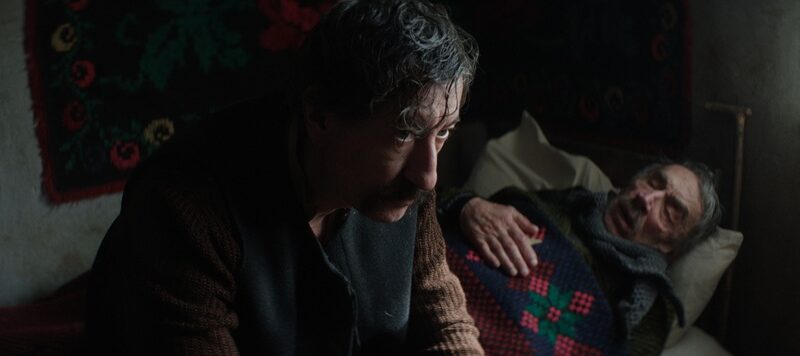Celebration (Anković, 2024)
Celebration (Proslava) is one of those films that one wants to grade on a curve. It has a serious topic — the rise of fascism in Croatia. It is competently directed and acted. It is, as director Bruno Anković emphasizes in the film’s press kit, timely and designed to be so. And yet it drags and lags. At eighty-six minutes it feels too slight for its themes and yet too long for its style.
Based on the novel by Damir Karakas, the film features two timelines. It begins at the end of World War II with Mijo hiding in the woods. Yet much of the film takes place in 1933 and chronicles Mijo’s experiences as a youth witnessing the rise of German fascism and its influence on his family and village.
Croatia, we are told, was a puppet state of Germany during World War II, but unless viewers are conversant with Croatian history, it may not be as apparent as it needs to be (until the end) that Mijo was most likely fighting for the Nazis and being hunted by communists in that part of the film. The film is, I think, meant to illustrate how fascists use nationalism to appeal to youth and why youth are tempted by and fall for the allure of it. I am guessing this is what Anković means when he says Mijo is both protagonist and antagonist.
For those unaware of Croatian history from the beginning, the flashback structure causes a problem. The hiding scenes are generic. Mijo uses binoculars to watch soldiers in his village. Mijo gets food brought to him. Mijo lies in a barn and sings a hymn under his breath. These scenes induce empathy, but only on a human level, not a political one. Whether Mijo is questioning his own or his generation’s political choices or is just cold, hungry, and afraid is not really apparent.
There are two ways of framing the film’s execution problem: style and budget. But the two may well be so intertwined as to make the answer of which is the bigger problem moot. The end-of-war fugitive narrative is so focused on Mijo that absent the interior monologues that novels are better at than films, that section struggles to convey scope or context. Stylistic differences between European productions and American studio productions are most easily seen in editing and pace. Hollywood, narrative-driven movies typically have shorter scenes, getting to the action point of the scene quicker and cutting almost immediately after the essential action or dialogue has taken place.
I am not here to argue that one style is intrinsically better. I love neorealism and enjoy the stylistic shadow it casts over world cinema to this day. But more often than not, that sort of style gives focused attention to a smaller story. The backdrop may be large, as it surely is in Rome, Open City, Germany Year Zero, or Bicycle Thieves, but the story that takes place in that context is small enough to convey. The impact of the culture (or cultural forces) on the individual is more impactful than a detailed explanation of that context itself.
One might easily counter that this is exactly what Anković is trying to do. We get next to no exposition (until the end) and no depictions of the war. The flashback section ends at the establishment of an independent puppet state. But films like, say, The Silence of the Sea or A Man Escaped can use World War II as a backdrop for a tightly framed personal drama largely because the audience already knows the parts of the war story that make the backdrop. In the case of Croatian history, will that context be as well known to the people watching the film as those making it? I don’t know. I don’t think so.
Anković states in the film’s press kit that his budget was “extremely tight” and that shooting had to be completed in twenty-three days. So it is possible, maybe even fair, to acknowledge what he was able to accomplish with those constraints. At the same time, I thought a lot during this movie about comments John Sayles made after the release of Amigo. Sayles shared that his original story was much broader in scope but that he couldn’t secure financing to make it. Rather than make a cheaper version of his original story, he altered the story to something he could accomplish with the budget he had.
I can understand why Karakas’s novel would resonate with Anković, and why he would want to film it. I can also understand the immense challenges of trying to do so on a “tight” art-house budget. I don’t think a critic or anyone can tell a director, “You don’t have enough money to make this movie.” But there is a difference between how much it takes to get a movie made and how much it takes to do a story justice. What we end up getting in Celebration is enough to make us wonder what a less rushed production, a less constrained adaptation of the novel, would have looked like. That’s not quite the same thing as loving the version we got.

